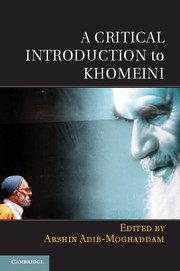Book contents
- Frontmatter
- Contents
- List of Map and Figures
- About the Authors
- Acknowledgments
- Glossary
- Timeline: The Life of Ayatollah Ruhollah Khomeini (1902–1989)
- Introduction Ayatollah Ruhollah Khomeini: A Clerical Revolutionary?
- 1 Khomeini and the “White Revolution”
- 2 The Rise of Khomeinism
- 3 Wilayat al-Faqih and the Meaning of Islamic Government
- 4 Ayatollah Khomeini’s Rule of the Guardian Jurist
- 5 Khatt-e Imam
- 6 Khomeini and the West
- 7 Gendered Khomeini
- 8 Hidden Khomeini
- 9 The Divine, the People, and the Faqih
- 10 Khomeini’s Legacy on Women’s Rights and Roles in the Islamic Republic of Iran
- 11 To Rule, or Not to Rule? An Alternative Look at the Political Life of Ayatollah Khomeini between 1960 and 1980
- 12 Khomeini and the Decolonization of the Political
- 13 Contentious Legacies of the Ayatollah
- Further Reading
- Index
- References
12 - Khomeini and the Decolonization of the Political
Published online by Cambridge University Press: 05 June 2014
- Frontmatter
- Contents
- List of Map and Figures
- About the Authors
- Acknowledgments
- Glossary
- Timeline: The Life of Ayatollah Ruhollah Khomeini (1902–1989)
- Introduction Ayatollah Ruhollah Khomeini: A Clerical Revolutionary?
- 1 Khomeini and the “White Revolution”
- 2 The Rise of Khomeinism
- 3 Wilayat al-Faqih and the Meaning of Islamic Government
- 4 Ayatollah Khomeini’s Rule of the Guardian Jurist
- 5 Khatt-e Imam
- 6 Khomeini and the West
- 7 Gendered Khomeini
- 8 Hidden Khomeini
- 9 The Divine, the People, and the Faqih
- 10 Khomeini’s Legacy on Women’s Rights and Roles in the Islamic Republic of Iran
- 11 To Rule, or Not to Rule? An Alternative Look at the Political Life of Ayatollah Khomeini between 1960 and 1980
- 12 Khomeini and the Decolonization of the Political
- 13 Contentious Legacies of the Ayatollah
- Further Reading
- Index
- References
Summary
On this blessed day, the day the Islamic community assumes leadership, the day of the victory and triumph of our people, I declare the Islamic Republic of Iran.
Ayatollah Khomeini’s proclamation of the Islamic Republic was not an act of a venerable theologian formally sanctifying a new political order. Khomeini proclaimed the Islamic Republic not because he was a senior religious authority, but because he had been instrumental in the overthrow of the Shah and the establishment of an Islamic Republic in Iran. To understand the significance of Khomeini, it is necessary to have an understanding of the articulation between being Muslim and political agency. In this chapter, I will first sketch out the recent history of Muslims as political agents before going on to discuss the role of Khomeini in this process. Before starting, it is necessary to state that one of the main obstacles to any analysis of the kind that I am offering is the way in which Orientalism continues to block any attempt to understand those deemed to be non-Western as being outside the framework of Eurocentrism. In other words, Orientalism contends that a Eurocentric episteme is universal and can unproblematically be deployed to understand non-Western phenomena, by maintaining the hierarchy between Western and Oriental. One of the key tropes of the Eurocentric episteme is precisely the implicit claim that the properly political is a preserve of Western patrimony.
By the political, I do not simply mean the domain of politics that is contained in government or legislative bodies. The political refers to three interconnected elements. Firstly, the political describes a situation in which a public distinction can be made between friends and enemies. Secondly, it describes the moment of decision; that is, the capacity of making rules in the context where there are no rules. Thirdly, the political refers to the institution of the social. Thus, the ability to found and congeal social relations, in other words to institute a society, is a function of the political. In contrast to the view of societies as political, and transformed through historical struggles, there is the view that some societies are timeless and unchanging, lacking history. People without history are also deemed to be people without the political, and they are by definition non-Western people.
- Type
- Chapter
- Information
- A Critical Introduction to Khomeini , pp. 275 - 290Publisher: Cambridge University PressPrint publication year: 2014



